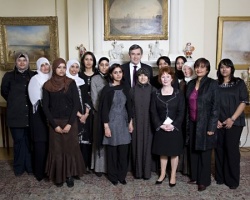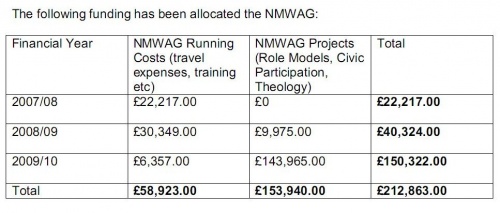National Muslim Women's Advisory Group
<youtube size="small" align="right" caption="10 Downing Street Report of NMWAG Launch Event on 21 November 2007.">gn84vfp30OQ</Youtube>

This article is part of the Counter-Terrorism Portal project of Spinwatch. |

The National Muslim Womens Advisory Group (NMWAG) is an initiative set up by the Department for Communities and Local Government in November 2007 to "influence and challenge the false and perverted ideology spread by extremists and give our young people the skills and knowledge to turn their backs on hate".[2] In essence, the NMWAG is one "part of a grassroots counter-terrorism strategy"[3] that has been "set up by Communities and Local Government as part of its work to prevent violent extremism."[4]
The NMWAG is led by 19 women, who "represent a wide spectrum of communities, professions and traditions" who will not only work toward preventing violent extremism, but toward "discuss[ing] issues and concerns...[that] affect Muslim women, for example access for women to mosques and their management committees and cultural barriers including honour crimes and forced marriages".[2]
Contents
Objectives
According to the DCLG, the specific remit of the NMWAG will be to:
- "act as ambassadors for Muslim women at grass roots and represent their views and concerns to Government;
- provide leadership to communities and act as positive role models for Muslim women in society;
- empower Muslim women to engage more with the media on a wide range of issues and help dispel myths around the role of Muslim women in society;
- meet in the form of a round table to discuss issues and concerns that are affecting Muslim women eg access for women in Mosques."[2]
Criticisms
The BBC reported in January 2008 that certain members of the NMWAG had informed the BBC that they had faced "direct criticisms" from within their communities that "they [were] being recruited to inform for government".[5] The BBC also reported that "Muslim women tend to be more marginalised than men - and in some communities face an uphill struggle to be heard outside their own homes."[6]
The Shadow Cabinet Minister for Social Cohesion, Sayeeda Warsi, criticised the NMWAG for being a group that was dividing communities and suggested that the creation of the group was "patronising because it says to Muslim women you can only engage with us as Muslim women and not as individuals.”[7]
In April 2010, one of the NMWAG's founding members resigned. Shaista Gohir, chief executive of the Muslim Women's Network UK, said she had become “disillusioned” with the initiative, which she now felt was a “political fad.” She outlined in a letter to Communities Secretary John Denham several factors prompting her resignation, including "the inactivity of NMWAG to collectively influence policies, lack of strategy to channel Muslim women’s view to the Government and its links with the Prevent agenda."
Gohir said she spoke out despite receiving government funding because she believed the NMWAG "had failed", and she could not “see sufficient justification to continue". “The funding has helped us build our capacity but NMWAG has not worked and women should be empowered through mainstream processes and I didn’t want to shy away from this... Despite recent efforts to make the group more active, I feel it is too little too late.”[8]
In her blog Gohir summed up her frustrations:
- The failure of this initiative highlights that the government is not serious about the role of women in influencing public policy. For example, initiatives are often launched to encourage women into public life, but are not matched with resources to support them. Women’s empowerment ends up becoming a tick-box exercise. [9]
Gohir had also authored a damning report about the Government’s Prevent agenda, saying it was stigmatising all Muslims and questioning whether it was the right way to address violent extremism. [10]
Members
The following names are of the 19 members of the NMWAG: [11]
Adeeba Malik (Bradford) | Andleen Razaq (London) | Batool Al Toma (Leicester) | Fareena Alam (London) | Farkhanda Chaudhry (Glasgow) | Naheed Arshad-Mather MBE (Yorkshire and Humber) | Parvin Ali (Leicester) | Reedah El-Saie (London) | Rokshanna Fiaz (London) | Rukaiya Jeraj (London) | Sabin Malik (London) | Sabira Murtaza Lakha (London) | Samina Kauser (North West) | Shahda Khan (Middlesbrough) | Shahien Taj (Cardiff) | Shaista Gohir (Birmingham)(resigned April 2010) | Siddika Ahmed (Oldham) | Tasneem Mahmood (Leicester) | Zulekha Dala, Nelson (Lancashire)
Funding
- The NMWAG has received, from 2007-08 till 2009-10, a total of £212,863.00 from the Department for Communities and Local Government. This funding has been all been allocated from the Preventing Violent Extremism Division of the DCLG budget. [13]
- For the year 2010-11, the DCLG has “contractually committed” £125,502,00 to the NMWAG to deliver projects. [14]
Notes
- ↑ Picture taken from Shaista Gohir - Can Muslim women tackle extremism?, Muslim Women's Network UK, February 2008, accessed 20.03.10
- ↑ 2.0 2.1 2.2 Muslim women to advise Government on preventing violent extremism, Department for Communities and Local Government, 21 November 2007. Retrieved from the Internet Archive of 10 October 2008, accessed 2 March 2016.
- ↑ Dominic Casciani,Muslim Women Advice on Extremism, BBC News, 23 January 2008, accessed 20.03.10
- ↑ Gordon Brown launches the Muslim Women’s Advisory Group, Department for Communities and Local Government, 31 January 2008, accessed 20.03.10
- ↑ Dominic Casciani,Muslim Women Advice on Extremism, BBC News, 23 January 2008, accessed 20.03.10
- ↑ Dominic Casciani,Muslim Women Advice on Extremism, BBC News, 23 January 2008, accessed 20.03.10
- ↑ Unknown Author, Muslim Groups Patronising, Asian Image, 27 October 2008, accessed 20.03.10
- ↑ Hamed Chapman, Another blow to Prevent as Gohir resigns as Government Advisor Muslim News, Issue 252, Friday 30 April 2010 - 15 Jumad al-Awwal 1431, accessed 14 December 2010.
- ↑ Shaista Gohir,14 April 2010 accessed 14 December 2010
- ↑ Hamed Chapman, Another blow to Prevent as Gohir resigns as Government Advisor Muslim News, Issue 252, Friday 30 April 2010 - 15 Jumad al-Awwal 1431, accessed 14 December 2010.
- ↑ Gordon Brown launches the Muslim Women’s Advisory Group, Department for Communities and Local Government, 31 January 2008, accessed 20.03.10
- ↑ Ingrid Barnes, Preventing Violent Extremism Division, Funding by Communities and Local Government (CLG) and its related bodies to the National Muslim Women’s Advisory Group. Freedom of Information Request Ref No. 20100325 – Letter to Rizwaan Sabir from Department for Communities and Local Government on 23 April 2010. Uploaded on 24.04.10
- ↑ Ingrid Barnes, Preventing Violent Extremism Division, Funding by Communities and Local Government (CLG) and its related bodies to the National Muslim Women’s Advisory Group. Freedom of Information Request Ref No. 20100325 – Letter to Rizwaan Sabir from Department for Communities and Local Government on 23 April 2010. Uploaded on 24.04.10
- ↑ Ingrid Barnes, Preventing Violent Extremism Division, Funding by Communities and Local Government (CLG) and its related bodies to the National Muslim Women’s Advisory Group. Freedom of Information Request Ref No. 20100325 – Letter to Rizwaan Sabir from Department for Communities and Local Government on 23 April 2010. Uploaded on 24.04.10
